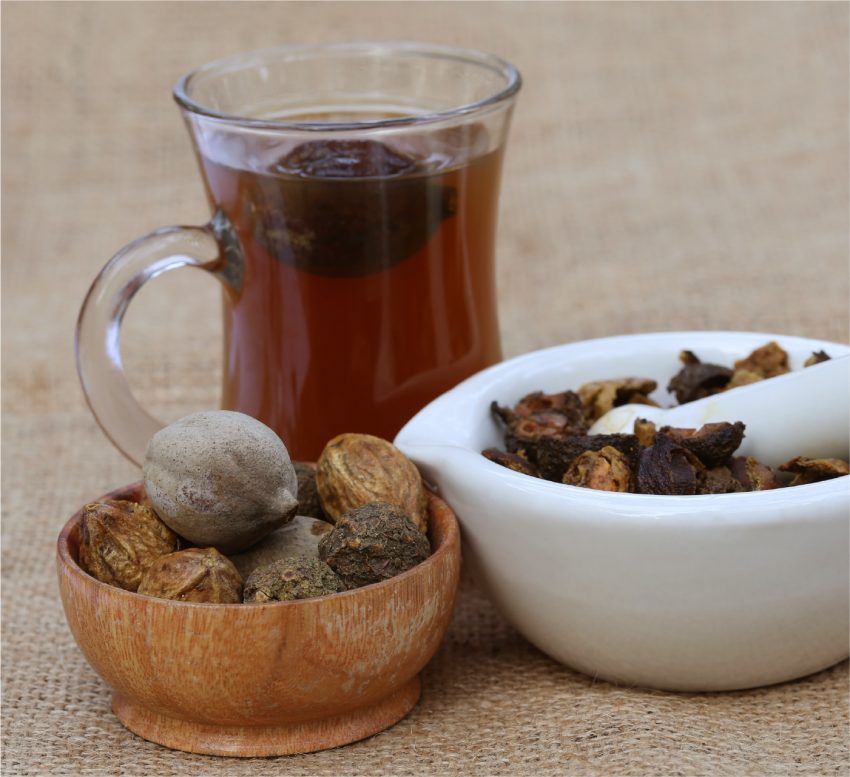Your liver is an important organ that is vital for your health. It performs a…
Read MoreThere is a strong possibility that Triphala was possibly the first ayurvedic medicine that you were prescribed by an ayurvedic practitioner to stimulate appetite and aid digestion.
Triphala, a Sanskrit word that translates to ‘three fruits’, is a herbal concoction of three dried fruits – amlaki (amla or Indian gooseberry), haritaki (harad or black myrobalan), and bibhitaki (baheda or belleric myrobalan). This combination, also known as polyherbal medicine, combines the therapeutic benefits of multiple synergetic herbs into a potent blend that is a panacea for every possible ailment. You can enjoy triphala benefits in juice or powder (triphala churna) form.

Triphala is considered a tridoshic rasayana – one that supports all three doshas. Individually, these three herbs have immense value in treating diverse health disorders but when combined, the potency and curative properties of this powerful concoction can treat myriad health issues related to digestion, heart health, immunity, diabetes, etc. Let us look at the individual curative properties of these three herbs:
One of ayurveda’s favoured herbs, amla, or Indian gooseberry as it is commonly known, is an edible fruit that is sour to taste and fibrous in texture. These nutritious fruits are considered to be one of the best sources of Vitamin C and other vital compounds like amino acids, phenols, tannins and a host of minerals. Extracted in juice or dry form, amla is used in ayurveda to treat constipation, boost immunity, improve skin and hair health, etc. In animal studies, amla has shown promise in inhibiting cervical and ovarian cancer cells but there are no known studies done on humans.[1]Zhu, Xinxian, Jianjun Wang, Yang Ou, Weiwei Han, and Huaifang Li. “Polyphenol extract of Phyllanthus emblica (PEEP) induces inhibition of cell proliferation and triggers apoptosis in cervical … Continue reading [2]De, Alok, Archana De, Chris Papasian, Shane Hentges, Snigdha Banerjee, Inamul Haque, and Sushanta K. Banerjee. “Emblica officinalis extract induces autophagy and inhibits human ovarian cancer … Continue reading
A very potent herb, bibhitaki contains powerful compounds like tannins, lignans and flavones that are beneficial in treating a variety of health issues. Its anti-inflammatory properties are beneficial in treating gout by inhibiting the buildup of uric acid.[3]Usharani, Pingali, Chandrasekhar Nutalapati, Venkata Kishan Pokuri, Chiranjeevi Uday Kumar, and Gangadhar Taduri. “A randomized, double-blind, placebo-, and positive-controlled clinical pilot … Continue reading Ayurveda also uses bibhitaki in treating irregularities in blood sugar levels and diabetes. The phytochemicals – gallic acid and ellagic acid, in bibhitaki keep blood sugar levels in check and improve insulin sensitivity while supporting the pancreas in secreting insulin.[4]Doan, Khanh V., Chang Mann Ko, Ann W. Kinyua, Dong Joo Yang, Yun-Hee Choi, In Young Oh, Nguyen Minh Nguyen et al. “Gallic acid regulates body weight and glucose homeostasis through AMPK … Continue reading
Haritaki holds high reverence amongst ayurvedic practitioners. This ancient remedy is a panacea for digestive disorders, especially in the treatment of stomach ulcers and constipation.[5]Mard, Seyyed Ali, Ali Veisi, Mohammad Kazem Gharib Naseri, and Peyman Mikaili. “Spasmogenic activity of the seed of Terminalia chebula Retz in rat small intestine: in vivo and in vitro … Continue reading Polyphenols and flavonoids in haritaki keep inflammation in check and reduce the impact of oxidative stress.
Oxidative stress, caused by free radicals, is a well-known cause of cell damage and a source of all chronic diseases like diabetes, heart disease, and cancer. Potent antioxidants like vitamin C and flavonoids help fight oxidative stress and this is one of the key triphala benefits. Inflammation is your body’s natural safety response to external pathogens or injury. But untreated inflammation, overreaction to inflammation, or inflammation without any external trigger (autoimmune response) can damage healthy cells, tissues, and vital organs. One of the key benefits of triphala is controlling inflammation in the body. Triphala’s abundant plant compounds and antioxidants are extremely beneficial in curbing unwanted inflammation and treating chronic disorders like arthritis.[6]Kalaiselvan, Sowmiya, and Mahaboob Khan Rasool. “The anti-inflammatory effect of triphala in arthritic-induced rats.” Pharmaceutical biology 53, no. 1 (2015): 51-60.
Other benefits of triphala include its immense promise in the treatment of numerous dental issues, due to its strong antimicrobial properties. Studies have shown that triphala extract inhibits the growth of different strains of bacteria that accumulate on the surface of the tooth and cause decay, demineralization and breakdown of tooth enamel.[7]Prakash, Shobha, and Anup U. Shelke. “Role of Triphala in dentistry.” Journal of Indian Society of Periodontology 18, no. 2 (2014): 132. Periodic use of triphala based mouthwash can significantly reduce plaque, inflammation of gums and formation of cavities.[8]Bajaj, Neeti, and Shobha Tandon. “The effect of Triphala and Chlorhexidine mouthwash on dental plaque, gingival inflammation, and microbial growth.” International journal of Ayurveda … Continue reading

Are you also struggling to burn that excess fat around your waist? Weight loss is considered one of the most important benefits of triphala. Scientific research proves the effectiveness of triphala in fighting stubborn fat deposits, especially around the belly and hips.[9]Kamali, Seyed Hamid, Ali Reza Khalaj, Shirin Hasani-Ranjbar, Mohammad Mehdi Esfehani, Mohammad Kamalinejad, Omidmalayeri Soheil, and Seyed Ali Kamali. “Efficacy of ‘Itrifal Saghir’, a … Continue reading Triphala juice, an effective digestive care juice, contains beneficial compounds that boost metabolism leading to better utilization of fats and increased energy. Triphala’s role in maintaining optimum digestive functioning results in effective breakdown and absorption of nutrients in food, resulting in less fat deposits.
Triphala has long been prescribed as a treatment for diabetes. Polyphenols like tannins, present in triphala effectively inhibit the glycolytic enzymes by binding to proteins, leading to lowered blood glucose levels. So, by suppressing the digestion and absorption of starch, triphala prevents post-meal spikes in blood sugar levels. One of the critical benefits of triphala is assisting the pancreas in boosting insulin production and improving overall insulin sensitivity (absorption of sugar) in cells.
Triphala juice, due to its laxative properties (rechana), is known to many as an effective solution for mild to chronic constipation. Triphala juice, an effective digestive care juice, is safe and natural and is a better alternative to synthetic over-the-counter laxatives. Triphala is a mild laxative that reduces abdominal discomfort and improves the frequency and consistency of emptying your bowels.[10]Mukherjee, Pulok K., Sujay Rai, S. Bhattachar, DEBUNATH P. KUMAR, Tuhin Kanti Biswas, Utpalendu Jana, Srikanta Pandit, Bishnu Pada Saha, and Pradip K. Paul. “Clinical study of … Continue reading Its antioxidant properties control intestinal inflammation which is the root cause of gastrointestinal problems like IBS.
Triphala contains abundant sources of phenolic compounds like tannins, lignans and flavones that are powerful antioxidants.[11]Usharani, Pingali, Chandrasekhar Nutalapati, Venkata Kishan Pokuri, Chiranjeevi Uday Kumar, and Gangadhar Taduri. “A randomized, double-blind, placebo-, and positive-controlled clinical pilot … Continue reading Its anti-inflammatory properties prevent abnormal spikes in uric acid. High levels of uric acid cause painful inflammation of bone joints, referred to as gout. Studies done on rats show that triphala fights bone and cartilage loss due to reduced bone collagen. Triphala’s anti is the treatment of choice for people suffering from chronic arthritis.[12]Kalaiselvan, Sowmiya, and MahaboobKhan Rasool. “Triphala exhibits anti-arthritic effect by ameliorating bone and cartilage degradation in adjuvant-induced arthritic rats.” Immunological … Continue reading
Triphala juice or triphala churna, has protective and curative benefits for your skin and hair. Triphala paste acts as an excellent exfoliator that cleanses the skin and prevents issues like redness, acne, dry skin, hyperpigmentation, etc. Its potent antioxidants suppress inflammation, reduce infection, increase collagen production, and rebuild the dermis. Being tridoshic in nature, triphala is safe and beneficial for all skin types. Triphala is equally effective in treating a host of hair problems like dandruff, premature hair fall, greying, and split ends. Its antifungal and antibacterial properties cleanse your scalp and unclog hair follicles leaving you with shinier, softer hair.
Triphala, in the form of juice or an eyewash made from triphala churna, is beneficial for preventing and healing eye disorders like macular degeneration, vision problems due to oxidative stress, senile cataracts, etc. The presence of vitamin C and flavonoids help improve glutathione levels and antioxidant enzyme activity that strengthens eye muscles and prevents cataracts, glaucoma, and other age-related degeneration of the eyes.
Want to buy triphala online? If you are looking for an authentic, natural source of digestive care juice, then we highly recommend Kapiva Triphala Juice. It is extracted from raw, dry herbs and not from extracts, to maximize its benefits. The juice is extracted by cold-pressing these herbs to retain all its nutritional value. No artificial colours or preservatives are added. We’ve kept the juice keto-friendly and vegan so that it appeals to everyone whilst fulfilling your nutritional requirements. So go ahead and buy triphala online without any apprehensions about quality and purity.
When and how to take triphala? Taking triphala every day is recommended for various internal and external health benefits. Its rejuvenating properties fight infections and provide vital energy. Triphala affects all three doshas, and its laxative properties prevent and treat constipation and other gastrointestinal issues like piles and diarrhea. The herbs used in triphala have antibacterial, antioxidant, and immune-boosting properties. Skin diseases, diabetes, heart disorders, arthritis, etc., are some of the conditions that triphala treats naturally.
One of ayurveda’s master formulations, triphala is an ancient herbal remedy that treats a variety of health issues. From being an effective gut cleanser and laxative to being a modulator of blood sugar levels in diabetic patients to keeping heart muscles in optimal condition, triphala juice acts as an effective digestive care juice. Ayurvedic practitioners will vouch that triphala is sometimes the first and only treatment that most patients need. It helps balance the three doshas and minimises multiple symptoms in a short period of time. Make it part of your everyday diet.
Yes. Triphala is considered safe for consumption on a daily basis. The typical recommended dosage is between 500mg to 1gm daily. Check with your doctor to find the best dosage as a daily health tonic or to treat specific medical conditions.
Triphala should generally be consumed on an empty stomach. It is recommended that you consume triphala early in the morning and in between meals with warm water. You can choose to ingest triphala juice or triphala churna (powder) or capsules.
Even though triphala is primarily used as a natural laxative to counter digestive issues like constipation, its rejuvenating properties make it a worthy daily tonic. Triphala benefits include improvement in your digestion, immunity, heart health, eyes, skin, hair, heart, teeth and gums and it also counters chronic conditions like diabetes and arthritis.
To get optimal triphala benefits, ideally consume no more than 50ml of triphala juice a day. The concentrations would vary for different manufacturers so it’s advisable to read the dosage recommendations on the label. You can also check with your doctor for a dosage that’s suitable for your health profile.
Yes. Triphala is considered a potent tonic for keeping skin problems at bay. Its antioxidants protect skin cells, rebuild the dermis, lock in moisture, regenerate skin collagen, and prevent inflammatory disorders like acne, pigmentation, dry skin, and redness.
Though generally safe, some people may experience stomach discomfort and diarrhoea. Lactating mothers, pregnant women, and young children should avoid triphala (though there isn’t any research to suggest any potential risks). People on medications for diabetes and blood thinning should avoid triphala. Stop taking triphala a few weeks before any impending surgery. As with any new medicine, wait for at least a week to see if the initial symptoms subside else stop or reduce the dosage.

References
| ↑1 | Zhu, Xinxian, Jianjun Wang, Yang Ou, Weiwei Han, and Huaifang Li. “Polyphenol extract of Phyllanthus emblica (PEEP) induces inhibition of cell proliferation and triggers apoptosis in cervical cancer cells.” European Journal of Medical Research 18, no. 1 (2013): 1-5. |
|---|---|
| ↑2 | De, Alok, Archana De, Chris Papasian, Shane Hentges, Snigdha Banerjee, Inamul Haque, and Sushanta K. Banerjee. “Emblica officinalis extract induces autophagy and inhibits human ovarian cancer cell proliferation, angiogenesis, growth of mouse xenograft tumors.” PloS one 8, no. 8 (2013): e72748. |
| ↑3, ↑11 | Usharani, Pingali, Chandrasekhar Nutalapati, Venkata Kishan Pokuri, Chiranjeevi Uday Kumar, and Gangadhar Taduri. “A randomized, double-blind, placebo-, and positive-controlled clinical pilot study to evaluate the efficacy and tolerability of standardized aqueous extracts of Terminalia chebula and Terminalia bellerica in subjects with hyperuricemia.” Clinical pharmacology: advances and applications 8 (2016): 51. |
| ↑4 | Doan, Khanh V., Chang Mann Ko, Ann W. Kinyua, Dong Joo Yang, Yun-Hee Choi, In Young Oh, Nguyen Minh Nguyen et al. “Gallic acid regulates body weight and glucose homeostasis through AMPK activation.” Endocrinology 156, no. 1 (2015): 157-168. |
| ↑5 | Mard, Seyyed Ali, Ali Veisi, Mohammad Kazem Gharib Naseri, and Peyman Mikaili. “Spasmogenic activity of the seed of Terminalia chebula Retz in rat small intestine: in vivo and in vitro studies.” The Malaysian Journal of Medical Sciences: MJMS 18, no. 3 (2011): 18. |
| ↑6 | Kalaiselvan, Sowmiya, and Mahaboob Khan Rasool. “The anti-inflammatory effect of triphala in arthritic-induced rats.” Pharmaceutical biology 53, no. 1 (2015): 51-60. |
| ↑7 | Prakash, Shobha, and Anup U. Shelke. “Role of Triphala in dentistry.” Journal of Indian Society of Periodontology 18, no. 2 (2014): 132. |
| ↑8 | Bajaj, Neeti, and Shobha Tandon. “The effect of Triphala and Chlorhexidine mouthwash on dental plaque, gingival inflammation, and microbial growth.” International journal of Ayurveda research 2, no. 1 (2011): 29. |
| ↑9 | Kamali, Seyed Hamid, Ali Reza Khalaj, Shirin Hasani-Ranjbar, Mohammad Mehdi Esfehani, Mohammad Kamalinejad, Omidmalayeri Soheil, and Seyed Ali Kamali. “Efficacy of ‘Itrifal Saghir’, a combination of three medicinal plants in the treatment of obesity; A randomized controlled trial.” DARU Journal of Pharmaceutical Sciences 20, no. 1 (2012): 1-8. |
| ↑10 | Mukherjee, Pulok K., Sujay Rai, S. Bhattachar, DEBUNATH P. KUMAR, Tuhin Kanti Biswas, Utpalendu Jana, Srikanta Pandit, Bishnu Pada Saha, and Pradip K. Paul. “Clinical study of ‘TRIPHALA’–A well known phytomedicine from India.” (2006): 51-54. |
| ↑12 | Kalaiselvan, Sowmiya, and MahaboobKhan Rasool. “Triphala exhibits anti-arthritic effect by ameliorating bone and cartilage degradation in adjuvant-induced arthritic rats.” Immunological Investigations 44, no. 4 (2015): 411-426. |


We are a team of food scientists and Ayurveda experts at Kapiva. Our mission is to raise awareness and educate people on ancient principles and herbs found in traditional texts. We work together to develop the most comprehensive content on Ayurveda which is grounded in peer-reviewed, scientific research.

Your liver is an important organ that is vital for your health. It performs a…
Read More
Do you tend to catch common illnesses like colds or other infections at the drop…
Read More
Modern medicine recognizes the importance of a wholesome diet for health. The ancient science of…
Read More
When you remove the water and milk from the butter and churn it, it turns…
Read More